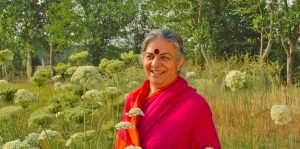
Dr. Vandana Shiva is an environmental leader, scientist, and activist. Author of over 20 books, she’s founder and leader of Navdanya, a non-governmental organization and movement that promotes biodiversity, organic farming, the rights of farmers, and seed saving. Her latest book is, Reclaiming the Commons: Biodiversity, Indigenous Knowledge, and the Rights of Mother Earth, published by Synergetic Press.
She’s delivering the keynote address at the Regenerate Conference.
3’14 what is “the commons”
4’14 corporations a relatively recent development
5’15 the origin of privatizing/patenting life
6’05 making it illegal for people to save their own seeds
7’06 saving seeds should be a duty, not a crime
8’46 biopiracy as the new colonialism
9’19 treating indigenous people as uncivilized barbarians
9’49 quinine, vaccinations–both indigenous practices
10’36 how patents on seeds affect farmers
11’22 first generation GMO a failure
12’05 suing Monsanto, being threatened by them for decades
12’50 the price of seed went up hugely
13’29 farmer suicides
14’15 farmers losing their land to multinational seed companies
15’20 farmers committing suicide by drinking the pesicides the companies sold them
16’57 plants’ natural resistance to pests weakens the plants’ natural resistance and creates a vicious cycle
17’43 “GMO” means “God Move Over”
18’32 Albert Einstein was her inspiration
19’12 the difference between reductionist and holistic thinking
20’41 Australian Aboriginal people farmed for 60,000 years and didn’t ruin it
21’15 early organic farming based on indigenous principles in India
22’04 gratitude and giving, giving back to the earth is fundamental to indigenous farming
22’33 “farming without farmers” is the new goal of some of these companies
23’25 converting from yield-per-acre to nutrition-per-acre
24’43 synthetic fertilizers come from explosives
25’20 shift from war mind to indigenous mind
25’38 dystopian high-tech farming vision
26’21 how Vandana organized around these issues–started with walking from village to village
27’33 the right place for seeds if farmers–started community seed banks
28’55 fighting law that would make it illegal to save seeds all over the world
30’31 biodiverse native seeds distribution systems
31’07 violence and the old and new colonizations
31’26 violence at the genetic level
32’02 the story of Percy Schmeiser, the Canadian farmer who was sued from Monsanto when they contaminated his crops with their seed
33’12 genetic contamination is the new pollution
35’14 envisioning a better system and bringing it to reality–a world of biodiversity
35’45 her farm, Navdanya, and the biodiverse model
36’18 change in paradigm is part of both building a healthy system and resisting the unhealthy one
36’50 moving away from the either/or mindset
37’19 self-knowledge, self-government, moving away from hate and fear
37’44 seeing ourselves as earth citizens rather than just consumers
38’35 small acts like growing a garden lead to bigger things–community, democracy, biodiversity
39’03 democracy as our everyday relationship with the earth, our bodies, and our health
40’24 the difference between the power of theft and the power within, of diversity
41’32 the relationship between diversity and social justice
43’17 Amazon’s “Alexa” is trying to teach Indian children what to eat–instead of their mothers
44’18 the destruction of local culture by monoculture companies
45’07 the non-violent ethic of biodiverse farming and the ethics of the Buddha, Gandhi, etc.
46’38 mother wrote about women’s rights
46’57 women are showing a new kind of leadership
48’18 the liberation we need is reclaim our identies as whole people, not just part of a commodity system
49’35 “economy” means the art of living, not money-making through extraction
50’09 our minds are biodiverse and need to be liberated if we want to see the connetions among the different systems of our lives
51’42 balancing the good parts of our high-tech world with nature
52’08 the value of choosing what tools you use–being the master rather than the servant of your tools
53’11 technology assessment as part of democracy–evaluating individually and collectively what technologies are beneficial to society
54’04 plants as sentient being who who respond in the way that people and animals do
54’49 the UN convention on biodiversity, but the US never signed it
55’12 bio-safety protocols are about assessing the effect of technology on health and communities
56’55 respecting the laws that protect people and nature, which are being dismantled during lockdown
57’54 corporate globalization outsourced the economy and destroyed a lot of American jobs
59’09 the US created the worst system and then spread it around the world. We need to start growing healthy food in a democratic/regnerative way
59’54 democracies grow from the ground up–we need the right to healthy eating



Subscribe:
Apple Podcasts
Spotify